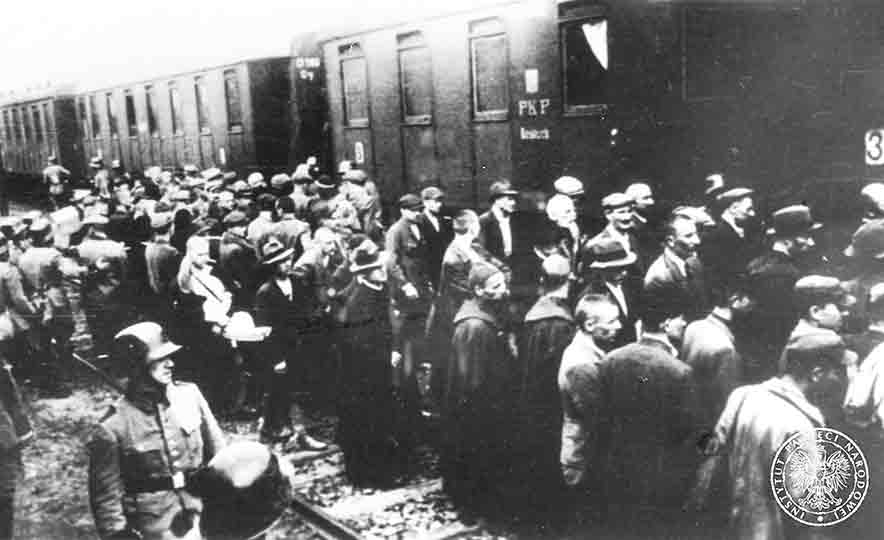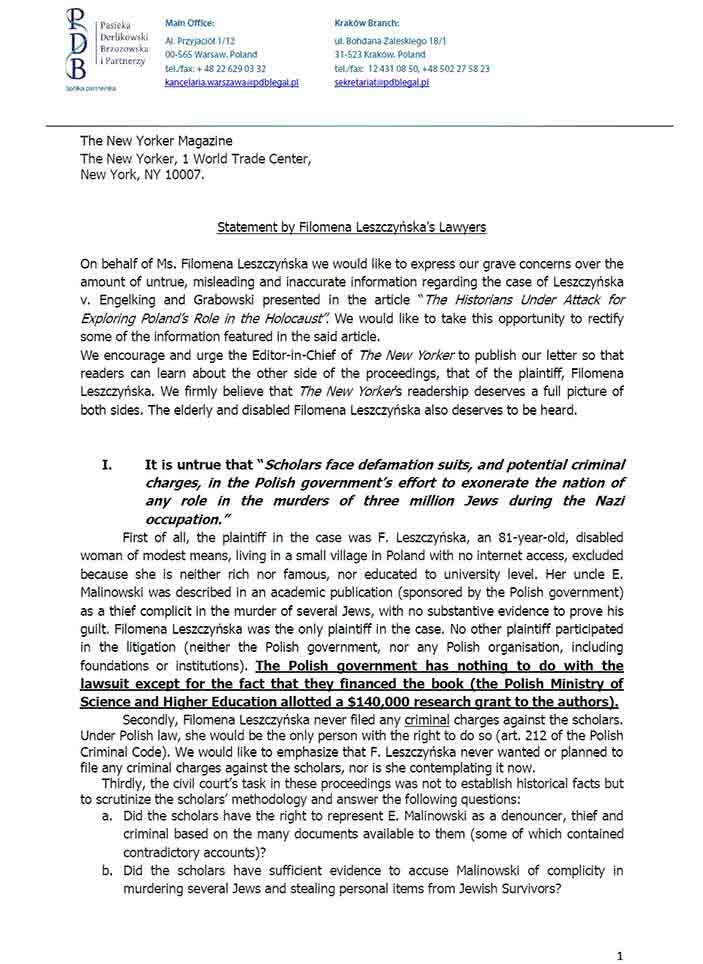I confess there’s much that I have in common with Masha Gessen, Barbara Engelking, and Jan Grabowski. We’re all middle-aged Jews, who by accident of birth in the post war era escaped the horrors of the Second World War experience. Additionally, our families originated from much of the same locales in Eastern Europe. My Dad’s people hailed from Lwow and Premysl in what was once the Austrian partition of the first Polish Commonwealth. On my mother’s side, I grew up hearing stories from both my Babcza and Great Babcza of life in a Russified Ukraine in the years before the 1917 revolution that ended Tsarist rule and brought Lenin and his gang to power over the expanse of Holy Russia.

Additionally, I share the same level of higher education Masha and her cohorts have attained. Although, I never used them in my professional life I hold advanced degrees in History and Business Leadership from two Chicago area universities. And while the three of them came of age in either Poland or the former Soviet Union, I’m a product of the American Midwest. Chicago born, raised in Indiana’s state capitol, Indianapolis, for years known to most outsiders for an annual car race and not much more. I suspect that while the three of them see things through the prism of Jewish secularism, I’ve been more of a believer throughout my life having lived these years as an observant, although very modernistic, believer in the Jewish religion. That has often put me at odds with the less religiously committed of my tribe, like Masha, and as such I’ve found more favorable friendships and alliances among both Protestant evangelicals and traditional Catholics.
I share this because as someone used to being “the other” it was only natural in the connectivity of things to extend that as to how I might come to look at Poland, the country, or as it existed in 1911, the occupied possession of the aged Austrian Emperor Franz Josef’s decaying empire that my Great-Grandfather took leave of to start a new life on the American prairie, downstate Kankakee, Illinois to be exact, in the years before the First World War.
It’s no secret that there’s a narrative out there that Jews and Poles are supposed to be natural rivals but as the medieval Spanish Jewish scholar Nachmanides once suggested it’s always easier to sprout a trough of falsehoods if you have the gift of distance. We weren’t exactly close to my Dad’s side of the family but in deliberations with his father at no time did I ever hear him, or his older siblings speak badly of the Polish neighbors they had left behind for the Land of Lincoln. Quite the contrary, I can think back to a Thanksgiving dinner five decades ago where he waxed nostalgically for camping trips in the forests of what became the Polish state come 1918. And as I matured into the student of history I tried to become, I was pressed into researching this real Poland, not the one portrayed in pop culture or fantasy laden docudramas aired on American television.
Coming across Norman Davies “God’s Playground” or Richard Watt’s amazing 1980 tome “Bitter Glory, Poland and its Fate” perked my interest and led me to the very obvious conclusion. Despite competing narratives, I had every right to claim for myself a stake in Polonia, the Polish Diaspora, as my classmate at Chicago’s Roosevelt University who slept in Grant Park, the night before Pope John Paul II’s outdoor mass there, to insure for himself a spot on the ground for the event during his historic Papal visit to the Windy City in ’79.
Naturally, articulating this sort of thinking hasn’t always left me the most popular fellow on the block with some of the circles I hang out in but at the end of the day it makes better sense to embrace a truth on the ground than a lie that seems to have come by way of some distant planet. It’s often forgotten, a point made by Dominic Pacyga in his wonderful account of Chicago’s Polonia, “American Warsaw”, that there was a much broader understanding of Polishness in the Windy City’s immigrant community that extended beyond identification with one religious solitude for instance. My late mother-in-law came of age in Chicago’s Humboldt Park neighborhood. Today this is largely a Puerto Rican enclave but when she was growing up there in the 1920’s and ‘30’s it was populated largely by Jewish and Polish immigrants who worked closely together on issues of mutual concern such as raising funds for war relief in both world wars. Among other things, I’ve heard a ninety something Jewish gentleman in suburban Chicago describe his Polish friends on the local high school basketball squad as nothing less than close family!
So, where’s the connection to Masha, Babs, and Jan in all of this? Well, quite frankly when I see them engaged in putting out the kind of false flag narratives, I won’t honor their fictional fantasies with the gist of being remotely related to having any relationship to historiography; it’s almost as if they are telling me: “you can’t be Polish because in doing so you are an obstacle to the agenda we have for the world.” That’s the sting of it.
Rabbi Steinberg, the Chief Jewish Chaplain of Poland’s Armed Forces, and a Khatyn martyr is best left forgotten, and a poet Julian Tuwim can be ignored entirely because he chose to return to the Poland he loved after the defeat of the Third Reich. Poland and Polishness is essentially an identity for the dark side, to borrow a line from the Star Wars franchise. Regretfully, or perhaps not so regretfully, I must share with Masha that you have bet on the wrong horse here. There’s much we can learn from a nuanced and authentic understanding of past protocols, but we won’t get there via the vehicles of slander or re-inventing history to serve our personal preferences. In my estimation, the recent decisions of the Polish judicial system, were not an attack on historical scholarship but rather an opening towards a better understanding of our common experience as fellow citizens of that great Commonwealth, Sienkiewicz extolled in his wonderful accounts of 17th century Poland, known to posterity as the “Trilogy”. Any takers?





